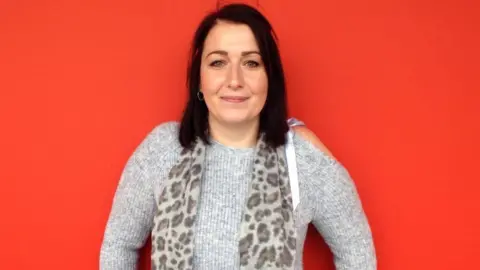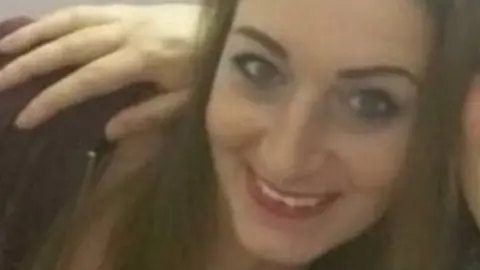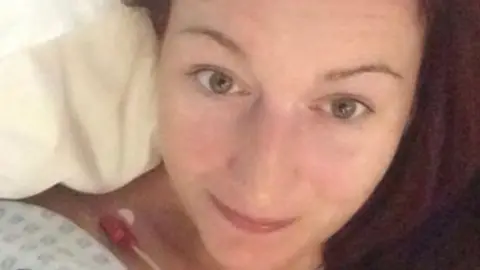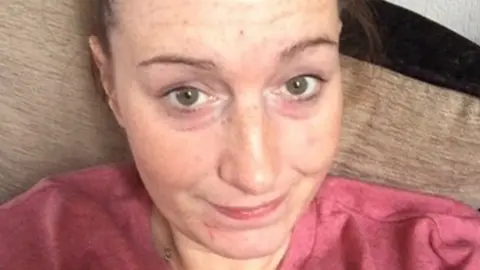'I begged doctors for a hysterectomy at the age of 28'
 Carrie-Mae Macmillan
Carrie-Mae MacmillanThe pain of endometriosis has plagued Carrie-Mae Macmillan for most of her life.
She says she was in such acute pain she couldn't walk, move or hold down a job.
But Carrie-Mae says she struggled for six years to be taken seriously.
Her doctor constantly told her what she was feeling was normal and dismissed her level of pain, she says.
Endometriosis is the second most common gynaecological condition in the UK.
Tissue that behaves like womb lining is found in other bits of the body, causing nasty symptoms.
Carrie-Mae blames it for the breakdown of her marriage, a chain of painful miscarriages and the inability to work.
 Carrie-Mae Macmillan
Carrie-Mae MacmillanShe reached the stage at the age of 28 when she begged her surgeon to perform a hysterectomy.
Carrie-Mae, from Old Kilpatrick in West Dunbartonshire, told the Kaye Adams Programme: "I was seeing the surgeon more than I was seeing my own family.
"I begged him for a hysterectomy but they wouldn't do it.
"I was told I was too young - it was too big an operation and my condition wasn't life-threatening so they just wouldn't do it on the NHS."
Over 10 years Carrie-Mae had more than 25 surgeries.
Not taken seriously
She said: "My body got adhesions from the damage, adhesions sticking my fallopian tubes together. The pain was becoming so unbearable."
She underwent laparoscopies to remove adhesions on her womb and bladder, but the relief would last for shorter periods as time went on.
Carrie-Mae ended up going private and paying for her own hysterectomy two years ago when she was 33.
But because there was so much damage, she still has to have regular operations to remove the endometriosis.
Endometriosis affects one in 10 women of reproductive age in the UK.
Yet it is incredibly difficult for a woman to be diagnosed and treated early.
 Carrie-Mae Macmillan
Carrie-Mae MacmillanCarrie-Mae knew early on she had an issue but felt she wasn't taken seriously for many years.
She said: "I was about 17 and with my friends.
"But they were not complaining and didn't seem to be in as much pain as me.
"As the years were going on, I couldn't get out of bed, I was missing school, really unwell, fainting and being taken into hospital.
"Doctors dismissed it as "women's problems" and kept thinking it was Irritable Bowel Syndrome (IBS)."
After getting married at the age of 21, Carrie-Mae's symptoms increased.
She said: "It was absolutely horrendous, like a vicious cycle. I had several miscarriages - another complication of endometriosis - and my third one destroyed me completely.
"I almost felt ashamed. I'm a woman and I'm supposed to carry a child."
'I don't want it to be for nothing'
It took a locum doctor to eventually get Carrie-Mae the diagnosis she was looking for.
This has led to constant surgeries, but at last she found comfort in being taken seriously by medical professionals.
Carrie-Mae is now sharing her story on her own Facebook blog, Mylifewithendo:wombraider.
She wants to raise awareness and help get women diagnosed earlier.
She said: "Because of everything I have been through, I don't want it to be for nothing.
"If me sharing my experience makes one young girl think to themselves, 'I'm going to force the issue', they might lead a completely different life to me.
"I am sure if I'd been diagnosed sooner I wouldn't have had half the complications I have had - I might even have had a family and things could have been different."
Carrie-Mae believes early diagnosis is key.
 Carrie-Mae Macmillan
Carrie-Mae MacmillanSo does Louise Peim, Support Network Manager for Endometriosis UK: "On average it takes seven-and-a-half years.
"Women will go to the doctor several times, be told their pain is normal, their symptoms are likely IBS.
"Some woman experience it longer than that and we don't know how many are walking around, dealing with it by taking pain killers."
She added: "We need greater education and awareness for medical professionals and in women themselves.
"If a woman is experiencing these symptoms and they are normalised by the health professional, it can have a, serious impact on their mental health.
"We are working hard towards bringing down that diagnosis time."

Endometriosis: The facts
•1 in 10 women of reproductive age in the UK suffer from endometriosis
•Endometriosis is the second most common gynaecological condition in the UK
•Endometriosis affects 1.5 million women, a similar number of women affected by diabetes
•10% of women worldwide have endometriosis - that's 176 million women
•The prevalence of endometriosis in women with infertility can be as high as to 30-50%
•On average it takes 7.5 years from onset of symptoms to get a diagnosis
•Endometriosis costs the UK economy £8.2bn a year in treatment, loss of work and healthcare costs
•The cause of endometriosis is unknown and there is no definite cure
Source: Endometriosis UK
